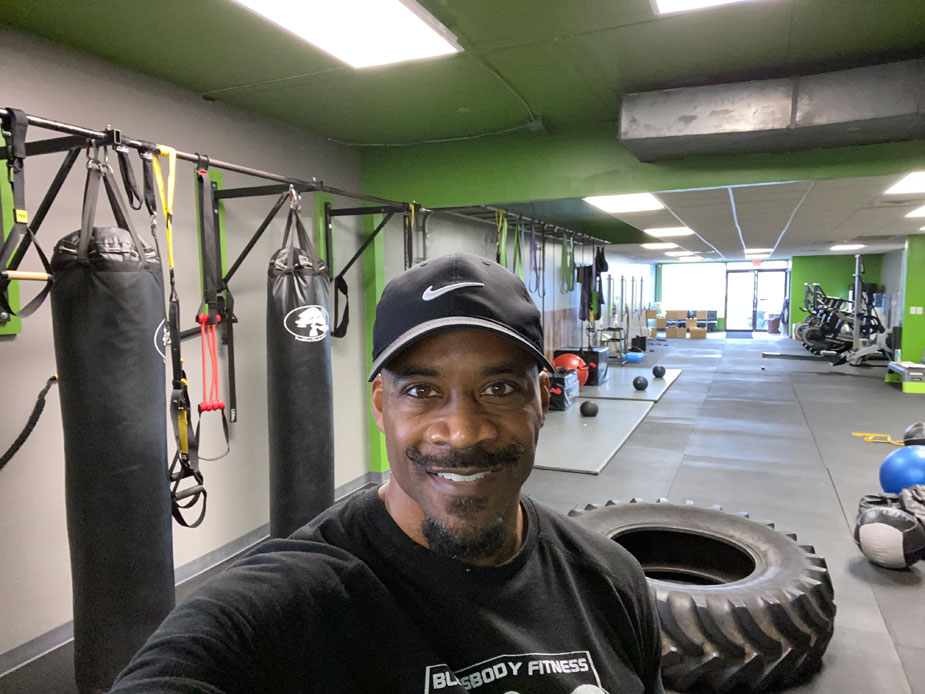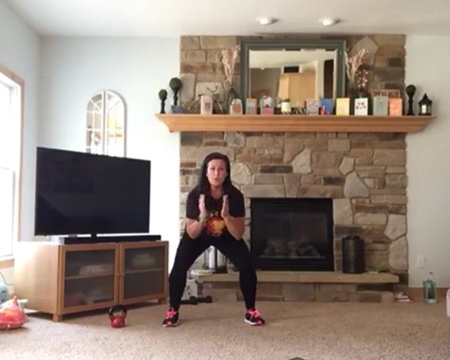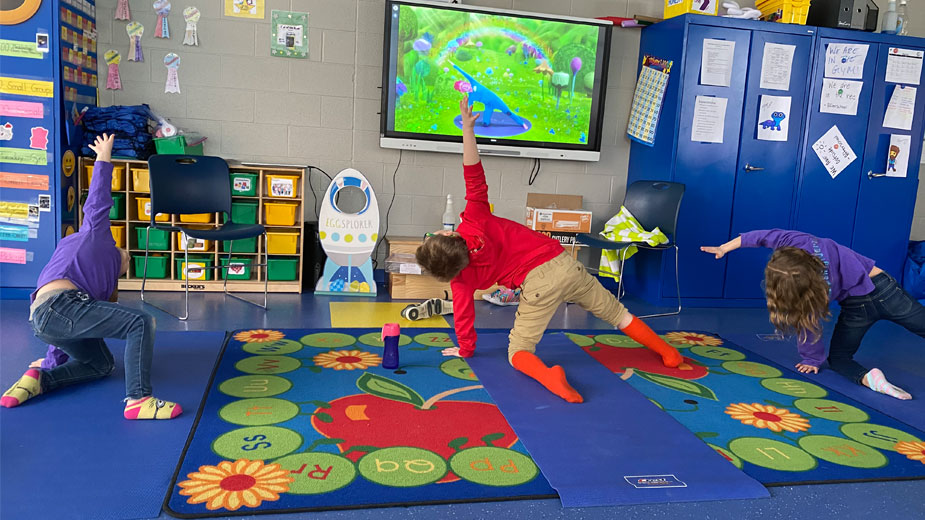YOUNGSTOWN, Ohio — It’s been over a month since area gyms and fitness centers closed their doors, effectively cutting off revenue and disconnecting them from tightly knit communities of customers.
But as they wait for word on when they can reopen, they are not sedentary.
Many have turned to virtual platforms, including YouTube and Facebook Live, to provide fitness instruction. This forces instructors to rethink their lessons based on what equipment their viewers have at home.
Every Tuesday and Thursday at 10 a.m., Creekside Fitness and Health Center, Boardman, hosts workouts on Facebook Live with with Samantha Womer, a personal trainer and instructor there, says Courtney Angelo, assistant manager.
Each class runs 45 minutes to an hour and usually draws about 30 viewers, which is the equivalent to an in-person class, Angelo says. Workouts are mostly cardio and some bodyweight exercises. Others use makeshift weights like grocery bags filled with items, Angelo says. Archived Facebook Live videos get anywhere from 500 to 700 views total.
“She’s well known and gives people something to look forward to,” Angelo says. “They really seem to like that.”
Train Station Fitness in Boardman hosts two free workouts daily on Facebook and Instagram, usually bodyweight exercises or using weighted book bags or duffle bags, says founder and CEO Angelo Babbaro.
The company also launched an app-based home program called TS Go for members with virtual instruction for seven program tracks. Some programs require a set of dumbbells, a jump rope and yoga mat, while others require additional equipment. It also posts monthly challenges to keep people engaged.
“Some of our athletes do have garage gyms, so they’re able to do our Crossfit programming,” Babbaro says. “At the end of the day, we just want them to be moving.”
TS Go is available for $39.99 monthly and Babbaro has seen sales in eight different states, he says, including former members who have moved or new members from out of state.
The free classes have also driven interest from potential future members, he says. Babbaro has been in contact with people who have committed to come out to the gym when it reopens or who are waiting to sign up for classes.
Joe Moss, owner of BlessBody Fit in Youngstown, has had similar results with his live virtual classes – something he never intended to do, but says it’s likely to be part of his business plan moving forward.
Moss used to post recorded workouts on YouTube or his website, but says he never knew if people were watching or if it benefited them. Since he started hosting live workouts via Zoom, he can respond immediately to viewers’ comments, allowing him to modify a workout if someone needs it. In that way, it’s similar to the kind of one-on-one attention he gives to customers in his gym, he says.
“It gives you that feedback right away,” Moss says. “That live aspect has really been a game changer for me.”
Moss can also conduct classes with trainers in other parts of the country, he says. The joint classes allow the trainers to bounce ideas off of each other while reaching new audiences they otherwise would not have connected with.

“It gives people an opportunity to be exposed to other peoples’ followers,” Moss says. “When you learn ways to connect with other people that are going through similar circumstances and have similar obstacles, it offers you the opportunity to put your heads together and find ways to overcome whatever is facing you.”
That increased connectivity has helped Moss drum up new business, he says, and he is developing virtual products to continue to serve new audiences. Even when the coronavirus pandemic lets up and gyms can reopen, Moss will maintain his “virtual gym” hybrid business model.
“I believe this is the new normal. Anytime you have a new normal, you have to put new habits in place,” he says. “It expands the business. Now I’m not just limited to the people in the Youngstown area.”
As fitness centers work to accommodate the home fitness trend, equipment dealers are seeing an increase in orders and inquiries from customers. In addition to seeing more customers wanting a piece of equipment for physical and mental wellbeing, Muscle Connection in Boardman is also seeing increased sales to individuals who need equipment for physical rehabilitation, says Jason Pridon, sales manager.
While the retail location cannot open its doors to the public yet, it is taking appointments for customers to come in, learn about a piece of equipment and make a sale. During appointments, all staff wear masks and the products are disinfected before and after the customer’s visit.
“We’re not operating how we used to,” he says. “We’re operating the only way we know how to at this time.”
Equipment deliveries are booked through May, though it’s not something the company can do immediately until the state lifts its order, he says.
Though fitness centers are finding new ways to provide their services, they still have to deal with the loss of revenue. The YMCA of Youngstown did not draft monthly membership dues in April and won’t in May, which is “a big hit to us financially,” says President and CEO Tom Gacse. All told, the organization has seen an 80% decrease in revenue since closing March 17 – the first time it’s closed its doors in 140 years – though hundreds of members have allowed the YMCA to continue drafting memberships as a donation, he says.
But the YMCA is not in danger of closing, Gacse says. In fact, the organization has found ways to serve the community differently. The Y applied for a temporary pandemic child care license for the Davis branch in Boardman and on average cares for seven kids daily, particularly for nurses, doctors and other essential workers from the nearby Mercy Health – St. Elizabeth Boardman Hospital, he says.
In addition to virtual classes conducted by the Y’s instructors, the organization has virtual spiritual offerings, such as Bible study and prayer requests. The website YMCAYo.org also has a collection of virtual fitness classes, including a home edition of 12 Rounds with Clemate Franklin, as well as family activities.

“It’s really been a great thing during the shutdown that we’re able to still connect with people,” he says.
Because blood drives are “more important than ever,” the Y is partnering with the Red Cross to host drives at the Central Branch May 7 and May 21, he says.
The Y has also offered to store food for Second Harvest Food Bank of the Mahoning Valley and United Way of Youngstown and the Mahoning Valley when the Covelli Centre – where food had been stored – was converted into a mobile hospital. While most of the Y’s staff has been laid off during the shutdown, those remaining have helped to bag the food for deliveries and made calls to senior residents for a wellness check, he says.
“It was a really great time for them because you hear about the social isolation with that senior group,” Gacse says. “Some of the calls they expected to be 10 minutes lasted 45 minutes. Our staff loved it.”
Maintaining that type of connection to the community has been difficult for fitness centers, particularly with keeping their customers motivated, says Train Station’s Babbaro. Going to the gym is a customer’s hour or two “to destress and unplug after a long day of work,” he says.
“The longer this goes, we’re starting to hear from our athletes more and more the impact it’s having on them. Not just physically, but emotionally, mentally and socially,” Babbaro says. “We know people are potentially sitting at home, binge eating, maybe drinking more than they should be.”
The Train Station maintains a members-only Facebook group to keep in touch with its members and to keep them motivated or coach them through a workout, he says.
The Boardman fitness center has seen a 30% drop in revenue thus far, he says. It’s particularly difficult this time of year when the gym typically kicks off its offseason sports programs for youth, high school and college athletes. The programs draw more than 50 athletes annually and bring in about $35,000 in the two-and-a-half-month period, he says.
“I don’t know if that’s going to be able to happen this year, or when it’s going to be able to happen,” he says.
To ease the burden, Babbaro has offered paying members contract extensions for however many days the gym is closed, he says. “So that’s an impact I’m going to feel for every month over the next year,” he says.
Creekside is also extending contracts for members who paid their annual dues in full, and has suspended payments for monthly members, Angelo says. The fitness center has laid off pretty much all staff until it reopens, including 15 front desk workers, 30 instructors and six personal trainers, she says.
Trainers have kept in touch with their clients to keep them active, as has the center’s manager, Lori Hillman, who primarily teaches the SilverSneakers members, Angelo says.

For now, the center is making plans for when it’s allowed to reopen, Angelo says. When it first closed, staff did a deep clean of the center and disinfected the equipment. Now, Creekside is looking to limit the number of available cardio equipment upstairs by marking off every other piece.
It’s more difficult with the weight equipment downstairs because not all of it is the same, she says. Heavy cleaning and sanitizing will be increased and Creekside would have to limit activities and gym capacity while keeping track of members coming and leaving, screening staff, conducting temperature checks and providing masks to people who need them.
Train Station also had a deep cleaning of its gym and equipment and is reorganizing the equipment in anticipation of reopening, Babbaro says. Some equipment from the floor is now stored on wall racks, freeing up space and making it easier to sanitize. Parts of the gym have also been repainted, he says.
“My goal is I wanted there to be a refreshed feeling when you come into the gym,” Babbaro says. “Our athletes haven’t seen it in a couple months. So I wanted there to be a renewed energy. Almost like a reopening.”
Six-foot-plus sections of the gym’s 15,000-square-foot space will be marked off to allow up to 200 square feet for an individual with equipment that will never leave that station, he says. All equipment will be cleaned before and after use.
Social distancing is “the filter through which everything is looked at” when the Y reopens, says Gacse. Since group sports, like basketball, likely still won’t be allowed, some of the Y’s workout equipment can be moved into those spaces.
“So we have a decent opportunity where people can use our machines and still feel safe that they won’t be sweating next to someone,” he says.
In addition, more cleaning and sanitizing stations will be set up throughout the Y.
BlessBody Fit is 50 yards long and 22 feet wide, so abiding by social distancing is as easy as spreading the equipment farther down the length of the building, Moss says. He plans to install a few TVs on the walls so customers can see the timers and instructors wherever they’re located in the studio.
He’s working with Cintas for cleaning supplies, but the big challenge is sourcing personal protective equipment, he says. Moss will likely increase deep cleaning of the studio to twice weekly up from just once, he says. For now, he’s connecting with other gym owners to determine best practices and guidelines.
“We have at least a month to get this thing figured out,” he says.
Pictured above: Kids workout at the YMCA Davis branch. The Y applied for a temporary pandemic child care license and sees about 7 kids daily.
